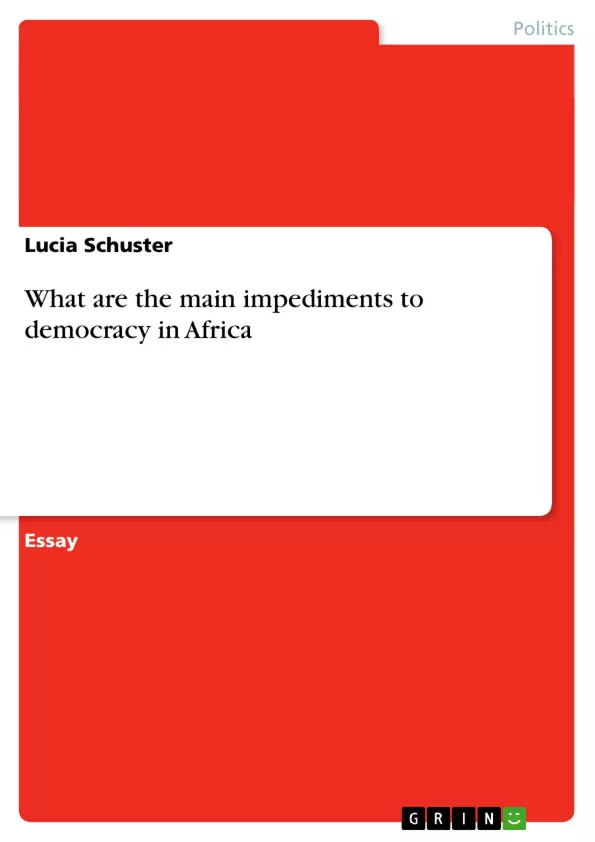Democracy in Africa has been shaped by the colonial powers that ran Africa until the period
of decolonisation that began in the 1960’s. Thereafter Africa has attempted to follow the
European model of democratic governance. However, whilst African democracy has shown
some improvement, it is still having legitimacy problems and African states are characterised
by corruption and autocracy.
This report will highlight the impediments to the furthering of democracy in Africa and what
can be done to increase the role of democracy in African States. There will be a focus on the
role played by colonialism and the ethnic divides that exist in Africa. We will then examine
how corruption and the economic problems of African States are restraining democratic
legitimacy and the effect these problems have on human rights. Lastly, we will concentrate on
the role that other state and non-state actors have on democracy in Africa.
However, before looking at these aspects of the debate, it is important to understand
democracy and its basis. Democracy is not a single approach but rather a commitment to
certain institutions such as the rule of law, civil society and political accountability through
free and fair elections by an electorate based on universal suffrage. It also includes (to a
varying degree) freedom of speech, the development of a civic culture and the acceptance of a
social contract.
Inhaltsverzeichnis (Table of Contents)
- Ethnic fragmentation
- Legitimacy deficit / Weak states
- Lack of economic development
Zielsetzung und Themenschwerpunkte (Objectives and Key Themes)
This report aims to shed light on the obstacles to the advancement of democracy in Africa and explore potential solutions for increasing its role in African states. The analysis will focus on the impact of colonialism and existing ethnic divisions, examining how corruption and economic challenges hinder democratic legitimacy and affect human rights. Lastly, it will investigate the influence of other state and non-state actors on democracy in Africa.
- Colonial legacy and ethnic divisions
- Corruption and economic challenges
- Democratic legitimacy and human rights
- Influence of state and non-state actors
- Impact of historical and cultural factors on democracy
Zusammenfassung der Kapitel (Chapter Summaries)
- Ethnic fragmentation: This section discusses the consequences of the arbitrary division of Africa by European powers during the colonial period, ignoring existing cultural groups and state systems. It examines how the imposed ethnic divisions contribute to political instability and tensions between groups, hindering democratic governance. The chapter further analyzes the role of ethnic identities in shaping party politics and the potential for ethnic conflict in multiparty elections, using Burundi as a case study.
- Legitimacy deficit / Weak states: This chapter delves into the challenges of imposing Western democratic systems on African states with vastly different cultural traditions. It highlights the clash between modern democratic values and traditional African governance structures, particularly the system of patronage and its influence on state legitimacy. The section also explores the limited democratic experience in Africa, the role of colonialism in shaping post-independence politics, and the impact of violence on the establishment of democratic governance. It discusses the lack of trust in government and its institutions due to limited experience with democracy and the erosion of traditional patron-client relationships.
- Lack of economic development: This chapter examines the connection between economic development and the establishment of sustainable democracy in Africa. It emphasizes the role of trust in government and economic performance in fostering democratic stability. The section explores the influence of economic challenges, including poverty, unemployment, and illiteracy, on democratic transitions. The chapter also discusses the impact of corruption on government legitimacy and its contribution to economic inequality. The section includes examples from South Africa, Botswana, and Zaire to illustrate the complex relationship between economic factors and democratic progress in Africa.
Schlüsselwörter (Keywords)
Key topics and concepts explored in this report include democracy in Africa, colonialism, ethnic fragmentation, state legitimacy, corruption, economic development, human rights, political culture, and the influence of external actors on democratic processes.
Frequently Asked Questions
What are the main impediments to democracy in Africa?
The report identifies ethnic fragmentation, a legitimacy deficit in weak states, corruption, and a lack of economic development as primary obstacles.
How did colonialism affect African democracy?
Colonial powers arbitrarily divided Africa, ignoring existing cultural groups, which led to ethnic tensions and political instability in post-independence states.
What is the "legitimacy deficit" mentioned in the report?
It refers to the clash between Western democratic systems and traditional African governance structures, such as patronage, which often undermines the trust in modern institutions.
How does economic performance impact democratic stability?
Sustainable democracy is closely linked to economic development; poverty, high unemployment, and illiteracy can hinder democratic transitions and reduce government legitimacy.
What defines "democracy" according to this report?
Democracy is seen as a commitment to institutions like the rule of law, civil society, political accountability, and free elections based on universal suffrage.
- Quote paper
- Lucia Schuster (Author), 2002, What are the main impediments to democracy in Africa, Munich, GRIN Verlag, https://www.grin.com/document/13831



